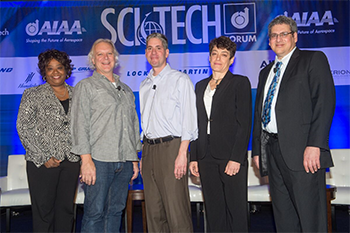Disruptive Technologies: Riding the Wave of Change Written 12 January 2017
Panelists: Moderator Joycelyn Harrison, program manager, Air Force Office of Scientific Research; Irene Gregory, senior technologist for advanced control theory and applications, NASA's Langley Research Center; Rob High, IBM Fellow and vice president and chief technology officer, IBM Watson; Steven Huybrechts, chief of staff, Applied Minds LLC; Robert Lutwak, program manager, DARPA
By Duane Hyland, AIAA Communications (2008-2017)

From the keystone that allowed ancient civilizations to build arches to the iPhone, humans have excelled at technological invention and disruption, a panel of experts said Jan. 12 at the 2017 AIAA SciTech Forum in Grapevine, Texas. What we haven't excelled at, they said, is adapting quickly to the change.
The "Managing Change During the Development of Disruptive Technologies" panel examined the pace of technological change in society across a wide variety of landscapes: quantum computing, adaptive aerospace controls, atomic physics and personal communication devices. The experts agree that the pace of development is quick.
Steven Huybrechts, chief of staff of Applied Minds LLC, explained, "If you don't pay attention to the technology that links us altogether and to the web, you're not paying attention to where your business will be in 10 years."
Panelists gave several examples of technology disruption.
Rob High, IBM Fellow and vice president and chief technology officer of IBM Watson, discussed Watson's ability to read through 200 million literary sources in three seconds in an effort to answer questions on "Jeopardy."
Irene Gregory, senior technologist for advanced control theory and applications at NASA's Langley Research Center, walked the audience through how adaptive controls will revolutionize flight.
And Huybrechts opined, "Chinese anti-satellite weapons are the biggest threat to the U.S. military's ability to operate around the world, and the U.S. government hasn't done anything about it but debate what to do about them since 2005."
The panel also said the traditional aerospace industry is vulnerable to being overwhelmed by startups.
"If it takes us 20 years to build a new airplane, how many generations of the technology outside the airplane have evolved?" Gregory asked. "If it takes us 10 years to develop new technology, we'll go out of business. Startups will take the risks, suffer the consequences, and they will prevail."
